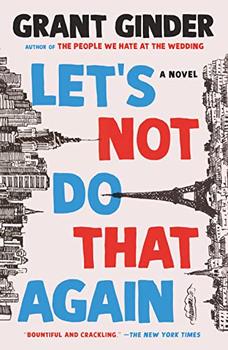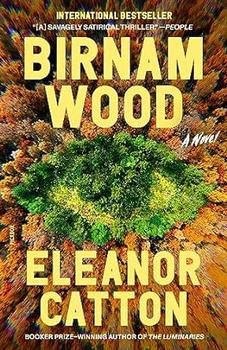Summary | Excerpt | Reading Guide | Reviews | Beyond the book | Read-Alikes | Genres & Themes | Author Bio

A Novel
by Grant GinderWe have all dealt with inescapable, insufferable family members at some point, and the ones who say they haven't are probably lying. I have read beautiful, fully dimensional novels about familial perseverance, but what about novels where a nuclear family blows up? What about a family that's affected by deep trauma, but also marked by family members who'd give you second-hand embarrassment if you eavesdropped on their conversations at a restaurant the table over from yours? Grant Ginder's Let's Not Do That Again wields acerbic wit and dramatic tension through the lens of a political family. In all the chaos of this captivating novel, Ginder insists that loving anybody is work — rewarding or not, it is a fight, and only you can estimate whether the fight is worth it.
Let's Not Do That Again almost seems like a sitcom at first, or a "...walks into a bar..." joke setup. It centers around a family with the key players dressed as stock characters we all know. Nancy, the calculating widow, is a liberal politician starchild, a Girl Boss archetype who throws almost every fiber of her being into her work. Greta, the black sheep daughter, is anti-establishment after the establishment has spoon-fed her success with a golden spoon. Nick is the existential artist, scholar, son and brother who glues the family together. Their deceased husband and father is just as much a part of this family despite his passing. By virtue of their familiar quirks and Ginder's masterful manipulation of narrative voice, readers easily fall for these characters. One aspect I found endearing is how the characters are lacking in self-awareness in the earlier parts of the novel but cast strong judgments on others, which makes them especially believable. From Greta: "I want to make something clear here: I was not—am not—a gamer. I didn't have some chair with a permanent indent of my ass in it, I changed my underwear every day, and I always brushed my teeth. At the time, though, I wasn't doing much of anything else." Greta, like all of the characters in the novel, only admits a fragment of her flaws, as long as she can leverage that against Someone Else Who Is Clearly Worse. This novel centers much of its conflict around blame — Who is to blame for how I am? Who is to blame for how the world is? are questions Ginder is especially interested in discussing and he does so exceptionally well.
These characters (in addition to some other beloved ones) seem like stereotypes until readers see Ginder pull back what's beneath their exteriors. Nancy, by viewing herself as someone who wants to better the world for her children, struggles with both being a loving mother and being the best politician she can be. Greta struggles to navigate self-respect and love that must originate from herself. Nick struggles to construct adult boundaries with his family and achieve his life goals without worrying about Nancy and Greta. These characters are more than the surface level understanding we might have for people like them — they aren't abstract concepts, but people readers get to know and love. No matter how hard these characters fight, no matter how much they might claim to be unlovable in one way or another.
This is a tender novel at its core. In the midst of its horrors (which are sometimes inappropriately funny), there is fighting, which means there is hope. There is hope for love to prevail, for oneself and one's family. Ginder writes, "sometimes, you do the things you do because you have to, and because the only option life has given you is to protect what you love." In that moment, in the dizzying midst where everyone has flung themselves overboard for someone else or is on the brink of doing so, I was enraptured by how much these characters would fight to love, under any and all wild circumstances. Ginder's book is not only a love letter to dysfunctional families, or even that side of the family you only see over holidays — it is a love letter to all families, to our loved ones, and to ourselves. It is a reminder that we fight for love because we care and we hope.
![]() This review was originally published in The BookBrowse Review in May 2022, and has been updated for the
April 2023 edition.
Click here to go to this issue.
This review was originally published in The BookBrowse Review in May 2022, and has been updated for the
April 2023 edition.
Click here to go to this issue.

If you liked Let's Not Do That Again, try these:

by Eleanor Catton
Published 2024
The Booker Prize–winning author of The Luminaries brings us Birnam Wood, a gripping thriller of high drama and kaleidoscopic insight into what drives us to survive.

by Emma Straub
Published 2021
A warm, funny, and keenly perceptive novel about the life cycle of one family--as the kids become parents, grandchildren become teenagers, and a matriarch confronts the legacy of her mistakes. From the New York Times bestselling author of Modern Lovers and The Vacationers.
Your guide toexceptional books
BookBrowse seeks out and recommends the best in contemporary fiction and nonfiction—books that not only engage and entertain but also deepen our understanding of ourselves and the world around us.